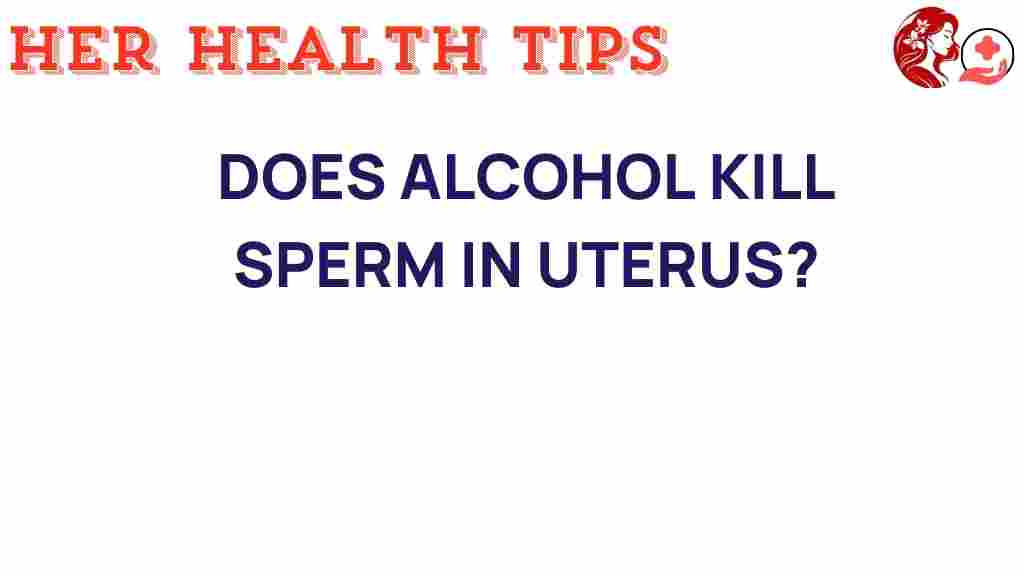The Surprising Truth: Does Alcohol Really Affect Sperm Health in the Uterus?
When it comes to reproductive health, the conversation often revolves around lifestyle choices that can influence fertility. One of the most debated topics is the impact of alcohol on sperm health. This article delves into the surprising truth about how alcohol consumption affects sperm and, ultimately, conception, shedding light on the implications for both men and women trying to conceive.
Understanding Sperm Health and Alcohol
Sperm health is critical for successful conception. Factors such as sperm count, motility, and morphology play a significant role in male fertility. Research suggests that alcohol can adversely affect these parameters, raising concerns for couples trying to conceive. Let’s explore how alcohol interacts with sperm health and the potential consequences.
The Effects of Alcohol on Sperm Quality
- Sperm Count: Studies have shown that heavy alcohol consumption can lead to a lower sperm count. Regular intake of large amounts of alcohol may result in hormonal imbalances that affect sperm production.
- Sperm Motility: Alcohol can impair the motility of sperm, meaning they may not swim effectively towards the egg, which is crucial for conception.
- Sperm Morphology: Alcohol consumption has been linked to abnormal sperm shape, which can hinder the sperm’s ability to penetrate the egg.
- Hormonal Impact: Alcohol can disrupt testosterone levels, which are vital for maintaining healthy sperm production.
These factors combined can create significant hurdles for couples attempting to conceive, emphasizing the importance of lifestyle choices when planning for a family.
Alcohol Consumption: Recommended Guidelines
Understanding how much is too much can be challenging. Here are some guidelines regarding alcohol consumption for men who are considering starting a family:
- Moderation is Key: The Centers for Disease Control and Prevention (CDC) suggests that men should limit alcohol intake to no more than two drinks per day.
- Abstinence: For optimal sperm health, consider abstaining from alcohol altogether for at least three months prior to trying to conceive.
- Consult a Doctor: If there are concerns about alcohol use, seeking professional advice can provide tailored recommendations for improving fertility.
Step-by-Step Process to Enhance Sperm Health
Improving sperm health goes beyond limiting alcohol consumption. Here’s a step-by-step guide for men looking to boost their fertility:
- Evaluate Lifestyle Choices: Assess your current lifestyle, including diet, exercise, and stress levels. Make necessary adjustments to promote overall health.
- Reduce Alcohol Intake: Follow the guidelines mentioned earlier to minimize alcohol consumption.
- Maintain a Healthy Diet: Incorporate foods rich in antioxidants, vitamins, and minerals, such as fruits, vegetables, nuts, and whole grains.
- Stay Hydrated: Drink plenty of water to support overall bodily functions, including sperm production.
- Exercise Regularly: Engage in regular physical activity to maintain a healthy weight and improve hormone levels.
- Avoid Toxins: Limit exposure to environmental toxins and chemicals that can negatively impact sperm health.
Common Myths About Alcohol and Sperm Health
Several myths surround the relationship between alcohol and sperm health. Let’s debunk a few:
- Myth 1: “A drink or two won’t affect sperm quality.”
Truth: Even moderate consumption can impact sperm count and motility. - Myth 2: “Only heavy drinkers should worry about fertility.”
Truth: Light to moderate drinking can also have adverse effects on sperm health. - Myth 3: “Once I stop drinking, my sperm will be fine.”
Truth: Sperm takes approximately 72 days to mature, so improvements may take time.
Alcohol, Sperm, and the Uterus: What You Need to Know
While the focus is often on male factors, it’s essential to recognize that the impact of alcohol extends beyond sperm health. Alcohol can also affect female partners in various ways:
- Hormonal Balance: Alcohol can disrupt a woman’s hormonal balance, making it harder to conceive.
- Uterine Environment: Excessive drinking can affect the uterine lining, which is crucial for implantation.
- Pregnancy Complications: If conception occurs, alcohol consumption can lead to complications during pregnancy.
Therefore, it’s crucial that both partners consider their lifestyle choices as they embark on the journey to parenthood.
Troubleshooting Tips for Couples Trying to Conceive
If you and your partner are having trouble conceiving and suspect that alcohol might be a factor, here are some troubleshooting tips:
- Track Ovulation: Use apps or calendars to track ovulation cycles, which can help pinpoint the best times for intercourse.
- Seek Professional Help: Consult a fertility specialist for personalized advice and testing.
- Open Communication: Discuss lifestyle choices with your partner to ensure both are on the same page regarding alcohol and health.
- Get Support: Join support groups or forums for couples trying to conceive to share experiences and gain insights.
Conclusion: The Path to Better Sperm Health and Conception
The relationship between alcohol and sperm health is complex and vital for couples looking to conceive. While moderate drinking may seem harmless, the potential negative impacts on fertility cannot be overlooked. By making informed lifestyle choices, couples can enhance their chances of successful conception.
In summary, prioritizing reproductive health means understanding the effects of alcohol on both partners. By taking proactive steps, such as reducing alcohol intake and adopting healthier habits, couples can pave the way for a brighter future filled with the joy of parenthood.
For further reading on enhancing fertility and understanding reproductive health, check out this comprehensive guide on fertility health. If you’re interested in the impacts of alcohol on men’s and women’s health, you may also find this resource valuable.
This article is in the category Reproductive and created by HerHealthTips Team
